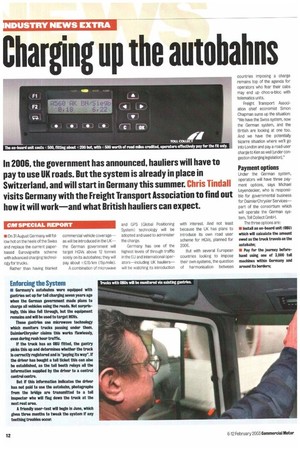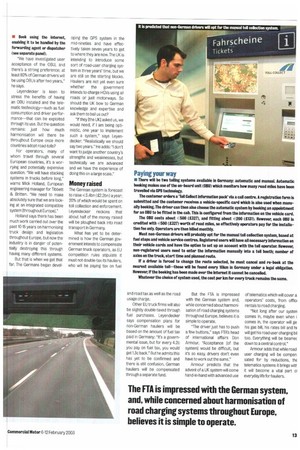Charging up the autobahns
Page 12

Page 13

If you've noticed an error in this article please click here to report it so we can fix it.
In 2006, the government has announced, hauliers will have to pay to use UK roads. But the system is already in place in Switzerland, and will start in Germany this summer. Chris Tindall visits Germany with the Freight Transport Association to find out how it will work and what British hauliers can expect.
CM SPECIAL REPORT
• On 31 August Germany will follow hot on the heels of the Swiss and replace the current paperbased Eurovignette scheme with advanced charging technology for trucks.
Rather than having blanket
commercial vehicle coverage— as will be introduced in the UK— the German government will target HGVs above 12 tonnes solely on its autobahns; they will pay about 0.15/km (15p/mile).
A combination of microwave and GPS (Global Positioning System) technology will be adopted and used to administer the charge.
Germany has one of the highest levels of through traffic in the EU and international operators—including UK hauliers— will be watching its introduction with interest. And not least because the UK has plans to introduce its own road user scheme for HGVs, planned for 2006.
But with several European countries looking to impose their own systems, the question of harmonisation between countries imposing a charge remains top of the agenda for operators who fear their cabs may end up choc-a-bloc with telematics units.
Freight Transport Association chief economist Simon Chapman sums up the situation: "We have the Swiss system, now the German system, and the British are looking at one too. And we have the potentially bizarre situation where we'll go into London and pay a road-user charge to Ken as well [under congestion charging legislation]."
Payment options
Under the German system, operators will have three payment options, says Michael Leyendecker, who is responsible for governmental business for DaimlerChrysler Services— part of the consortium which will operate the German system, Toll Collect GmbH.
The three options are: • Install an on-board unit (OBU) which will calculate the amount owed as the truck travels on the autobahn; • Pay for the journey beforehand using one of 3,000 toll machines within Germany and around its borders;
if Book using the Internet, enabling it to be handled by the forwarding agent or dispatcher (see separate panel).
"We have investigated user acceptance of the OBU, and there's a strong preference; at least BO% of German drivers will be using OBUs after two years," he says.
Leyendecker is keen to stress the benefits of having an OBU installed and the telematic technology—such as fuel consumption and driver performance—that can be exploited through its use. But the question remains: just how much harmonisation will there be throughout Europe once more countries adopt road-tolls?
For operators, many of whom travel through several European countries, its a worrying and potentially expensive question. "We will have stacking systems in trucks before long," warns Mick Holland, European engineering manager for Tibbett & Britten. 'We need to make absolutely sure that we are looking at an integrated compatible system [throughout Europe]."
Holland says there has been much work carried out over the past 10-15 years on harmonising truck design and legislation throughout Europe, but now the industry is in danger of potentially destroying this through having many different systems.
But that is when we get that far. The Germans began devel
oping the GPS system in the mid-nineties and have effectively taken seven years to get to where they are now The UK is intending to introduce some sort of road-user charging system in three years' time, but we are still on the starting blocks. Hauliers are not yet even sure whether the government intends to charge HGVs using all roads or just motorways. So should the UK bow to German knowledge and expertise and ask them to bail us out?
"tf they [the UK) asked us, we would need, if I am being optimistic, one year to implement such a system," says Leyendecker. "Realistically we should say two years." He adds: "I don't want to judge another country's strengths and weaknesses, but technically we are advanced and we have the experience of doing this on a large scale."
Money raised
The German system is forecast to raise €3.4bn (£2.2bn) a year; 20% of which would be spent on toll collection and enforcement. Leyendecker reckons that about hail of the money raised will be ploughed back into road transport in Germany.
What has yet to be determined is how the German government intends to compensate German truck operators, as EU competition rules stipulate it must not double-tax its hauliers, who will be paying tax on fuel
and road tax as well as the road usage charge.
Other EU truck firms will also be slightly double-taxed through fuel purchases. Leyendecker says compensation plans for non-German hauliers will be based on the amount of fuel tax paid in Germany: "It's a governmental issue, but for every 4.2c you pay on fuel tax, you would get 1.3c back." But he admits this has yet to be confirmed and there is still confusion. German hauliers will be compensated through a separate fund. But the FTA is impressed with the German system and, while concerned about harmonisation of road charging systems throughout Europe, believes it is simple to operate.
"The driver just has to push a few buttons," says FTA's head of international affairs Don Armour. "Acceptance [of the system] would be difficult, but it's so easy, drivers don't even have to work out the sums."
Armour predicts that the advent of a UK system will come hand-in-hand with advanced use of telematics which will cover a operators' costs, from °fro rentals to road charging.
"Not long after our systen comes in, maybe even when i comes in, the operator will ge his gas bill, his rates bill and h( will get his road user charging bil too. Everything will be beamec down to a central control."
Armour adds that while road user charging will be compensated for by reductions, thE telematics systems it brings wit it will become a vital part ol everyday life for hauliers.




























































































































































